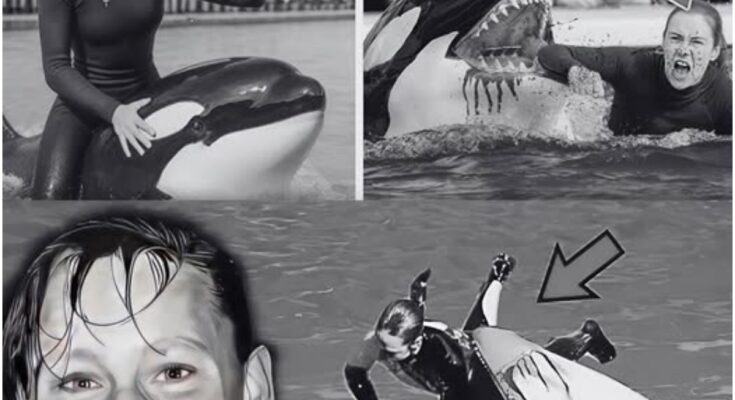The fatal incident took place during what was supposed to be a routine training session. Witnesses report that the killer whale, known for its strength and intelligence, suddenly turned aggressive and attacked its trainer without warning. The trainer, a seasoned marine mammal expert with years of experience, was pulled underwater multiple times and sustained fatal injuries. Despite immediate rescue attempts, she could not be revived.
This tragedy is not the first involving this particular orca. Records reveal that the whale has been involved in at least two previous incidents, both resulting in injuries to trainers. While those earlier events were downplayed and attributed to “miscommunication” between human and animal, this recent fatality has made it impossible to ignore the dangers any longer.

The public reaction has been intense and emotional. Animal rights activists argue that these majestic creatures should never have been confined to artificial environments in the first place. Organizations such as PETA and the Whale and Dolphin Conservation Society have renewed calls for the closure of marine parks that house captive orcas. According to them, the stress, boredom, and lack of space experienced by whales in captivity often lead to abnormal behavior and aggression.
Meanwhile, the victim’s family is calling for a full investigation and greater transparency from the marine park. In an emotional statement released through their legal representative, the family expressed their heartbreak and frustration. “She loved her job and loved the animals,” the statement read, “but she always knew that there were risks. What we didn’t know was how much the park knew and chose not to share with its trainers or the public.” The family is reportedly considering legal action and has demanded that the park release all internal safety records and previous incident reports involving the orca.
Experts in marine biology and animal behavior are also weighing in. According to Dr. Elizabeth Monroe, a marine mammal specialist, incidents like this are a tragic reminder that orcas are wild animals with complex needs. “No matter how well-trained or seemingly friendly they may appear, orcas are predators with natural instincts,” she said. “Captivity changes their behavior and can lead to psychological distress, which sometimes manifests in dangerous ways.”

The marine park has so far remained mostly silent, issuing only a brief statement expressing condolences to the family and noting that the whale is being kept under observation while an internal review is conducted. They have not yet commented on whether the whale will remain at the park or be relocated, nor have they confirmed if the show schedule will be permanently altered in light of the incident.
Public pressure is mounting. A petition demanding the release of the orca to a marine sanctuary has already garnered over a million signatures within days. Social media platforms are flooded with messages of outrage, grief, and demands for change. Hashtags like #FreeTheOrca and #JusticeForTheTrainer are trending globally. Former employees of the park have also come forward anonymously, sharing stories of understaffed training teams, ignored safety warnings, and a culture of prioritizing profit over animal and trainer welfare.
This tragic event has reignited a global discussion that has been brewing for decades. Documentaries such as “Blackfish” have previously shed light on the hidden world of captive orcas and the dangers involved, both for the animals and their human handlers. The recent death has brought those issues back to the forefront with renewed urgency.

In the coming weeks, government authorities are expected to launch a formal investigation into the incident. Animal welfare laws, occupational safety standards, and the future of marine parks are all likely to be examined under intense scrutiny. Some lawmakers have already called for legislative changes that would phase out or prohibit the keeping of large marine mammals in captivity altogether.
As the investigation unfolds, the future of the killer whale remains uncertain. Many are calling for the orca to be moved to a coastal sanctuary where it can live in a more natural environment, while others argue that it may now be too dangerous to keep alive. Whatever the outcome, this tragedy has become a turning point in the ongoing debate over wildlife in entertainment.
The story of the trainer’s death and the killer whale responsible is far from over. It raises serious questions about our relationship with nature, the ethics of captivity, and the responsibilities of those who claim to care for animals while also profiting from them. As the victim’s family grieves and the world watches, one thing is certain: change is inevitable, and the truth can no longer be ignored.



